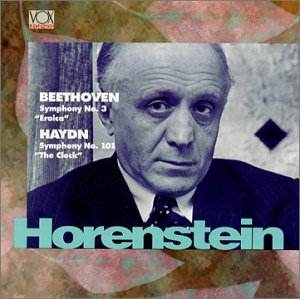During his time with Vox in the 1950s Jascha Horenstein
recorded four Beethoven symphonies Ė the Third, Fifth, Sixth and Ninth.
In fact he recorded the Third twice for them: once in mono in Vienna
in 1952 and again in Baden-Baden in 1957 when stereo had become available.
Vox have, for obvious reasons, chosen to reissue the stereo remake but
I wish they had taken note of the fact that the earlier mono recording
had the finer orchestra and represents Horensteinís interpretation of
this cornerstone work much better. That isnít to say that this second
recording doesnít have any value; it does. Itís just that you have to
put aside any qualms about some less-than-secure ensemble and what can
best be described as a lack of corporate commitment to what Horenstein
is trying to do which itself must have had an effect on what he was
able to do.
He maps the first movement with his customary single-mindedness
through the familiar practice of one modular tempo to suit the whole
movement meeting every eventuality. If this were a map it would
be of the physical structure of the landscape: all primary colours to
indicate those features that are independent of anything that humans
may have put there. For this reason it may seem to some listeners rather
two dimensional. What you in fact end up with is certainly a surprisingly
lyrical account of the movement, though one that is way off the very
fast tempo Beethoven probably wanted. But Horenstein is certainly not
alone in that respect and as I have always preferred my Eroicas
grand and romantic there is no criticism from me there. However, in
the final analysis I do think Horensteinís first movement misfires through
the inability of his orchestra to play in a manner that suggests no
more than a "run-through". His own unyielding approach on
this occasion delivers too much dourness where animation and energy
is needed. The second movementís funeral march fares better with a dark-toned
counterpart to the first movement. There are some passages of real intensity,
notably from the tension Horenstein screws up in the central fugal section.
After this the third movement has to act as a bridge between the dark
drama of the first two movements and the extraordinary transformation
that takes place in the last. I think Horenstein fails in this by again
not injecting enough lift and essential energy into the scherzo
material. His tempo and tone are simply too dogged to make you aware
that a new world of feeling may be ahead. Here is an example of where
one of this conductorís most interesting traits can seriously be to
his detriment. Once again the orchestra sounds under-rehearsed; not
really in sympathy with the man with the stick. The suspicion raised
in the third movement that the performance would ultimately fail to
deliver that essential transformation of mood that comes with the last
movement and makes this symphony so remarkable proves to be correct.
Right the way through, these Prometheus variations are unable
to throw off the overall dour tone that threatened the first movement
and compromised the third. So in this movement, of all the four, the
effect is profound. The impression remains that this is what Horenstein
really meant to give us because it is delivered quite well in itself.
However as a convincing presentation of this symphony as a multi-faceted
world of its own it is a real disappointment. If the "Eroica"
fails in those terms I believe it has failed altogether. Horenstein
had quite a dark temperament that could sometimes prove inappropriate
and that is the case with this "Eroica", I think. If you also
add this to an orchestra that is neither top-flight nor appears to be
in sympathy with him then the conclusion is that this recording is one
for Horenstein admirers and the curious. For more compelling "Eroicas"
there is an immense list to choose from with men like Monteux and Klemperer
at its head.
With big band sonorities and spacious tempi Horenstein
clearly sees Haydnís clock as a big, solid, mahogany Grandfather with
a second movement pendulum that is possessed of an impressively wide
swing and a weight the size of a dinner plate. The central section of
this movement in particular is unashamedly grand and imposing but in
fact all the spacious tempi Horenstein adopts throughout the symphony
are sustained well by the orchestra. The recorded balance with woodwind
close in further demonstrates the quality of these Viennese players.
This contrasts with their colleagues in Baden-Baden who let Horenstein
down in the Beethoven. The last movement could have done with being
a little more vigorous but played like this it suits the rest of the
performance. It has the same mordant and searching quality that is set
out so well by Horenstein in the dark and elegiac introduction to the
first movement. The recorded sound in both works on this disc is very
much the "house style" of Vox in being warm and reverberant
but simple and clear in layout. Only a little distortion gives away
the 1950s vintage.
Whilst the Beethoven ultimately disappoints, the Haydn
is sufficiently interesting to make this disc a welcome reissue from
the Vox Horenstein collection.
Tony Duggan


